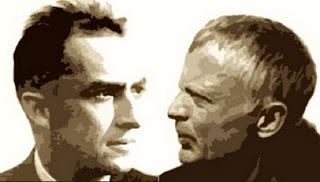LISTEN TO THE SHOW
 Two tried-and-trues among the short poems of William Carlos Williams, as chosen for our 30th PoemTalk by Robert Grenier, who has been thinking about his WCW for many decades. First the metaphorical anti-metaphor of ocean and plant in “Flowers by the Sea”:
Two tried-and-trues among the short poems of William Carlos Williams, as chosen for our 30th PoemTalk by Robert Grenier, who has been thinking about his WCW for many decades. First the metaphorical anti-metaphor of ocean and plant in “Flowers by the Sea”:
When over the flowery, sharp pasture's
edge, unseen, the salt ocean
lifts its form—chicory and daisies
tied, released, seem hardly flowers alone
but color and the movement—or the shape
perhaps—of restlessness, whereas
the sea is circled and sways
peacefully upon its plantlike stem
And then, seemingly quite different but just as classic an instance of early modern condensation, “so much depends” (“The Red Wheelbarrow”):
so much depends
upon
a red wheel
barrow
glazed with rain
water
beside the white
chickens.
Charles Bernstein and Bob Perelman (Grenier once taught the latter poet at Berkeley, by the way) joined Al Filreis to speak with Robert Grenier about why and how he is always in the act of remembering these poems – or, as he puts it near the start of our talk, how the poems are remembering him. “Those words return,” says Grenier.
Al asks Bob P. and Charles to comment on the poetic relationship(s) between Grenier and Williams. Bob P. remembers Bob G. on Williams as fundamentally as Bob G. remembers his WCW. Grenier has always dwelled on the short vowel sounds emanating outward from “chickens.” It’s about farming and the social aesthetic and other big topics, but it’s also, says Bob P., about the patterning of words’ sounds. This was what Grenier had already taught us, years ago.
The group, prompted by Al, discusses the autotelism of “Flowers by the Sea,” and, for Charles, both poems have a “specific autonomy.” When Charles admiringly isolates the line “edge, unseen, the salt ocean,” he is put in mind of a Larry Eigner and of a possible lineage running through WCW to Eigner. He is implying there a place for Robert Grenier in that line, of course, since Grenier, at the time this session was recorded, was just then anticipating the publication of his four-volume edition of Eigner’s poems.
We discuss what WCW meant when he said of the more famous of our two poems that it was “the same as a thing of beauty.” The red wheelbarrow as locating a rewriting of Keats’ “Endymion”! “It an injunction,” says Grenier, “to pay attention to something because of its moral value. And it directs you to what is in the fact an image, in itself, as an image…. Words being composed as letters, as a composition of successive shapes. It only happens because of the conjured quality of the form.”

